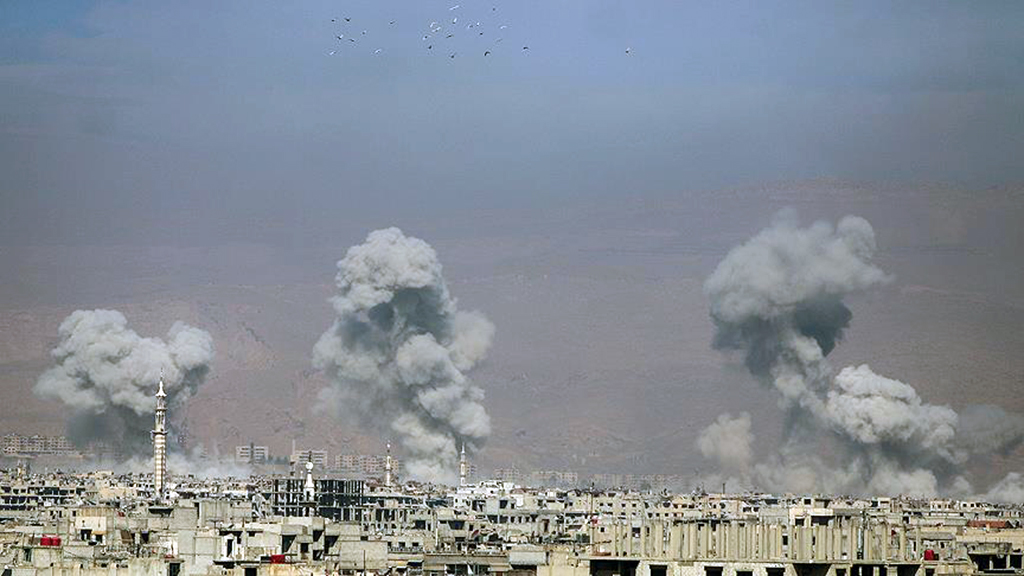
Syrian tug of war and Ankara's expectations
The chemical attack in Eastern Ghouta resulted in unprecedented tensions between Russia and the United States in Syria.
Share
The chemical attack in Eastern Ghouta resulted in unprecedented tensions between Russia and the United States in Syria. Governments around the world are concerned that the crisis, which U.S. President Donald Trump kicked off on Twitter by threatening Moscow with smart bombs, could lead to a hot conflict between the two military superpowers and global media outlets are openly talking about a possible third word war.
It would appear that Washington is prepared to conduct a more comprehensive assault on Bashar Assad's regime than last year's airstrikes on the Shayrat Air Base. Russia responded to Trump's threats by beefing up the regime's security and telling Washington, Paris, London and Tel Aviv, which recently targeted Iranian positions in Syria, to refrain from escalating tensions.
Having worked with Turkey and Iran to launch the Astana talks in an effort to get the situation in Syria under control, Moscow does not want the U.S. to change the balance of power there. The Kremlin is therefore opposed to Washington's efforts to partner with France, Britain and Saudi Arabia to play a more significant role in the Syrian war. As such, Putin wants to establish that there will be no easy victory for the U.S. in Syria. In the wake of a potential U.S. assault, Iran and its supporters in Iraq also voiced support for the Assad regime.Simply put, the Syrian war, which the international community proved unwilling to resolve in its early stages, has turned into a black hole that is dragging various powers into darkness. Currently in its eighth year, the conflict has entered a new stage with the main players getting their hands dirty to protect their proxies.
Let us recall that U.S. airstrikes targeted regime forces and Iranian-backed militias during an assault on U.S.-partnered People's Protection Units (YPG) militants in Deir ez-Zor last February. Several Russian fighters were reportedly killed in the strike. Just as Washington stepped up to the plate to protect its proxy then, so too is Russia actively supporting Assad now.Going forward, there are three options available to the United States to either withdraw, increase military engagement or accept Russia's role and take a step back.
If Washington pulls out of Syria now, it will have suffered a humiliating defeat to Russia and Iran. Needless to say, this course of action would render Iran's containment elusive.
Additional military engagement, which would involve the strengthening of the French, British and U.S. presence in Syria, could create a dangerous balance of power. Obviously, what the U.S. would hope to accomplish by taking this action is quite important. If Washington wants to bomb Assad out of office, it is important to admit that former President Barack Obama missed that opportunity years ago. Since 2015, Russian involvement in Syria and the rise of Iranian-backed Shiite militias prevented the regime's removal. Without committing ground forces, regime change will not be possible. Needless to say, deploying hundreds of thousands of U.S. troops to Syria would be a radical step, even by Trump's standards. It also goes without saying that managing the risk of a hot conflict with Russia, which is heavily invested in the regime, is an extremely difficult task.The third and final option is to make a military commitment just serious enough to get a seat at the negotiating table in Astana, which means recognizing Russia's influence. If Washington takes that step, there would be an uptick in clashes and negotiations between the active players in the conflict zone.
To be clear, all three options suggest that the situation in Syria is unlikely to de-escalate anytime soon. Therefore, President Recep Tayyip Erdoğan made the right move by speaking with Trump and Putin in an effort to reduce tensions.
At this point, Turkey wants to see Assad held accountable for his regime's atrocities but remains unwilling to place at risk its cooperation with Moscow without getting a sense of Washington's broader Syria policy and where YPG, the PKK terrorist organization's Syrian affiliate, fits in it.
All parties to the ongoing tug of war in Syria must approach Ankara with proposals taking its priorities into consideration.
[Daily Sabah, 13 April 2018]
Tags »
Related Articles






